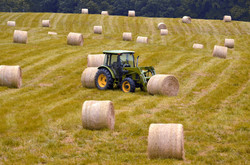
EU Observer | 14 April 2023
EU needs land reform to stop Big Agri swallowing up small farms
In the face of increased land grabbing and speculation, the European Commission must put a common land governance framework on the political agenda in coming months to ensure a future for farmers and protect the well-being of citizens. The urgency of the situation has seen farmers of European Coordination Via Campesina write their own European directive proposal, presented to representatives of DG AGRI and MEPs in March.
Protecting natural resources such as land, water and seeds is key to general public interest in the face of climate, environmental, and social emergencies. Recent demonstrations in France against proposed mega-basins — and the resultant acts of police violence against demonstrators — are just one example of how citizens are increasingly taking action to protect common interests from private companies and governments that prioritise profit, not people.
Agricultural land makes up 38 percent of EU territory and as attention has honed in on climate struggles and making European agriculture more sustainable, land is featuring more prominently on the European political agenda, sitting at the crux of many current agricultural and societal issues.
The European Parliament and European Economic and Social Committee have already called upon the European Commission to implement a land governance framework, and the rights and responsibilities to protect land are outlined in international texts such as the UN Declaration on the Rights of Peasants and Other People Working in Rural Areas and the CFS Voluntary Guidelines for Responsible Governance of Tenure of Land, Fisheries and Forests.
The lack of European land policy is incoherent with other EU policy goals and plays a major role in future farmers not having access to land. It also contributes to the loss of biodiversity, increases agricultural greenhouse emissions and pesticide use, and more generally, makes it harder to ensure access to sufficient and healthy food for the European and global population.
According to research carried out at the request of the European Parliament's AGRI committee, by 2040 the EU could lose an additional 6.4 million farms, leaving a total of about 3.9 million across the EU (a loss of 62 percent compared to 2016).
Data shows Europe's farming population is ageing: more than half of all farmers will reach retirement age within the next 10 years. But who will continue to work the land?
Only 11 percent of farmers are under 40, and younger generations face many difficulties in becoming farmers. At the same time the financial value of land is attracting increasing numbers of non-agricultural investors, more interested in growing profits than growing food. Facilitating access to land through equitable land tenure policies is therefore key.
Currently, companies are able to monopolise and misuse land to maximise profits, and free movement of capital is given higher priority than ensuring companies' actions are sustainable, responsible or legal.
Big Agri, short-term profits
As part of this, farms are growing in size and this move to larger, industrial models allows multi-national companies to increase their own short-term profits, while passing on the long-term costs to farm workers, animals, citizens and the planet. From health issues, environmental damage, poor food quality, increased pesticide use, degraded soil quality, pollution and poorer animal welfare, the impacts on society are overlooked to line the pockets of a few individuals.
However, if the European Commission put a land governance framework on the political agenda, for example in the form of a land directive, it would hold member states accountable for implementing national policies to ensure that land is used in the general interest of society and not as any other commodity. In many countries and in particular in eastern Europe, the lack of European legislation makes it unclear what measures states can implement to regulate land markets without facing further action from the EU.
Perhaps the most concerning element for European citizens is the fact that European policy — and therefore taxpayer money — is funding and driving harmful land concentration.
For example, CAP subsidies are paid per hectare, encouraging companies and farmers to consider land as an asset and speculate as much land as possible in order to receive more money, with few restrictions on how that land must be used. In addition, EU representatives often claim that land tenure regulation is a member state competence of, but according to EU founding treaties, the EU could act and give guidance on how to stop land concentration and facilitate access to land for small and medium-scale farmers — if they had the political will.
While national initiatives to build fundamentally different land systems do exist, often current frameworks obstruct these initiatives instead of supporting them. In all but a few cases, member states have failed to address the issue of land governance sufficiently. A land directive would set common objectives across Europe, while allowing member states to implement policies that best serve their context.
Agriculture, the environment and markets are all key competency areas for the EU and land is an underpinning factor in each of these topics. We have a common agricultural market yet no common regulations on farming structures, which increases internal inequalities and unfair competition, and makes it impossible to implement sufficient measures to achieve climate and agricultural goals.
Therefore, given the finite, particular and exceptional nature of land, the European Institutions have a key role to play regulating and protecting it. With other EU institutions and international legal documents recognising this, it is time the European Commission rose to the challenge, to protect farmers and citizens alike.











